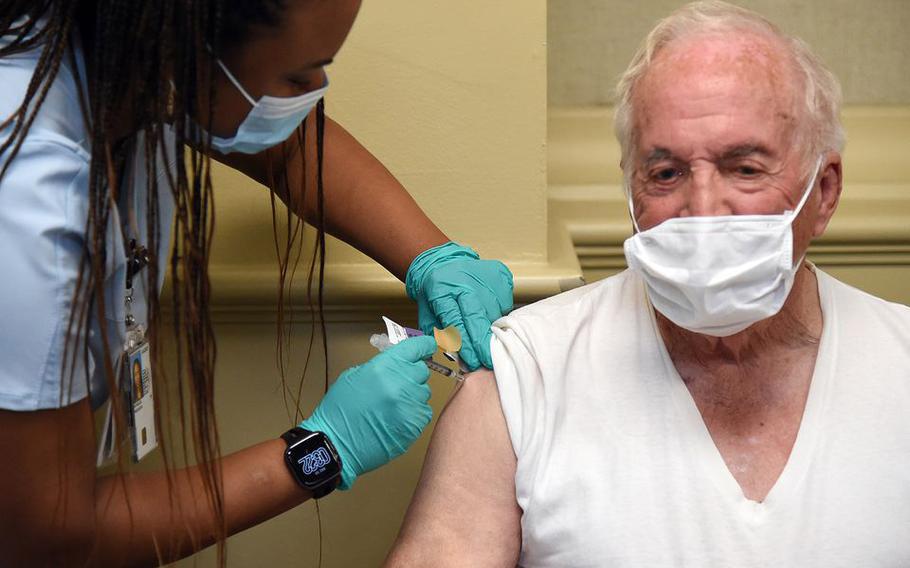
Korean War veteran Norman Hale, 90 of Vinemont gets his coronavirus vaccine shot from RN Precious Reynolds at the Birmingham VA Medical Center, December 17, 2020. (Joe Songer/al.com)
Stars and Stripes is making stories on the coronavirus pandemic available free of charge. See other free reports here. Sign up for our daily coronavirus newsletter here. Please support our journalism with a subscription.
WASHINGTON — The Department of Veterans Affairs decided this week it would administer coronavirus vaccinations to veteran caregivers — a population that was not included in the agency’s vaccination strategy.
Richard Stone, executive in charge of the Veterans Health Administration, sent a memorandum Tuesday to all VA network directors that instructed their facilities to “provide COVID-19 testing and vaccines to primary and secondary family caregivers to support the health and safety of veterans.” To be eligible, caregivers must be enrolled in the VA’s Program of Comprehensive Assistance for Family Caregivers.
Before the memo, the VA wasn’t planning to give caregivers the vaccine. Instead, caregivers were in line with the rest of the general population and were relying on their local health authorities. The change was made after a dozen organizations that advocate for veteran caregivers pleaded with the VA, the Centers for Disease Control and Prevention, the Department of Health and Human Services and the Federal Emergency Management Agency.
“Caregivers maintain constant, intimate, close contact with disabled veterans,” said one of those groups, the Independence Fund, before the memo was issued. “The disparity in timing … to both parties puts the veteran in the unique situation of receiving the vaccine long before the caregiver assisting them will, potentially putting the veteran at risk for close exposure.”
Jennie Beller, 58, is one of the caregivers who is now eligible to receive a vaccine through the VA. Beller is the primary caregiver for her husband, Charles, a 68-year-old Vietnam War veteran. Charles Beller has diabetes, a result of exposure to the chemical herbicide Agent Orange, and he suffered a stroke 10 years ago that left him paralyzed on one side, in a wheelchair and unable to speak, read or write.
In March, at the start of the pandemic, Jennie Beller became his full-time caregiver. The two have remained at their home in Indianapolis and haven’t seen family or friends in 10 months.
When the VA released its initial vaccination plan and caregivers weren’t included, she was concerned.
“I am his only caregiver,” Beller said. “If something happens to me, it’s a big deal. So that was very worrisome. I’ve been worried what would happen to him if I got sick.”
Beller learned Thursday morning about her eligibility for a vaccine through the VA.
“It’s a huge relief,” she said.
There are still questions about when those vaccines will be administered, the Independence Fund said Thursday.
The VA began vaccinating patients and health care workers Dec. 14, starting with residents and staff of the department’s long-term community living centers and spinal cord injury centers. As of this week, the VA has vaccinated 254,880 people, including 65,923 veterans and 188,957 employees.
On Tuesday, the department said it was administering vaccines to Department of Homeland Security employees in eight areas of the U.S.
The VA’s strategy said after the community living centers, it would vaccinate VA employees who treat coronavirus patients, as well as veterans and staff living in other nursing facilities that don’t yet have access to vaccines.
Once it’s done with those populations, the VA plans to vaccinate health care workers who aren’t in coronavirus units, as well as other hospital employees, such as police, food services workers and administrative staff. All other VA essential workers, as well as homeless veterans, patients on dialysis, organ transplant patients and veterans undergoing chemotherapy are next on the list.
After that, the VA will start vaccinating patients based on their age, with those 85 and older going first. Veterans ages 50 and younger will be the last to receive a vaccine. During this phase of vaccinations, the VA plans to prioritize veterans who have high-risk conditions, such as cancer, obesity, diabetes or heart disease.
As of Thursday, the virus had killed 7,689 veterans and 109 VA employees, with many of those deaths occurring in the past two months. Four employees and 590 veterans died in the past week, according to agency data.
wentling.nikki@stripes.com Twitter: @nikkiwentling